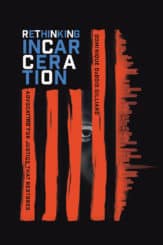
Editor’s Note: We are reprinting Kathy Khang’s review of “Rethinking Incarceration” because we feel it is helpful in the current cultural conversation.
It isn’t enough to keep up with current events. Never mind the flurry of posts on social media. The daily ticker of local, national, and international news should have an impact on the way we Christians think, pray, and live our lives in community. Christians need to understand history as well as the present, especially as we consider how our actions are informed by theologies shaped in the past and lived out in the present. If we believe God is the same yesterday, today, and tomorrow, we must come to a deeper understanding of how our past has shaped our present.
If we believe God is the same yesterday, today, and tomorrow, we must come to a deeper understanding of how our past has shaped our present.
Author Dominique DuBois Gilliard does exactly that in his book Rethinking Incarceration: Advocating for Justice That Restores. Gilliard makes sure readers understand today’s mass incarceration epidemic is not a recent phenomenon but an intentional outcome, despite rhetoric that tries convince us the days of slavery and Jim Crow are in the past.
Gilliard writes with clarity and purpose, drawing on and honoring the past work of Michelle Alexander in The New Jim Crow, Bryan Stevenson in Just Mercy and Ta-Nahesi Coates in Between the World and Me. Gilliard then adds to the collection of work by outlining the development of the lucrative industry of mass incarceration—where the driving value is profit—with Christianity. Rehabilitation and justice are not part of the business model when it comes to mass incarceration, and Gilliard does due diligence explaining the development of the modern-day prison system and inviting readers of faith to see how western Christianity has participated in the expansion and public support of mass incarceration as a substitute for justice.
Instead of language around justice and restoration, mass incarceration relies on upholding “law and order.” Gilliard takes an entire chapter to remind Christians that our calling to “pursue righteous relationships and just standards as community” is not permission to defend a justice system that is broken and disproportionately impacts poor minorities. “Law and order” may sound like a good idea, maybe even benign, but “has always functioned as dog-whistle politics—racial legislation ensconced within coded rhetoric about the common good.” If you don’t hear the dog whistle, perhaps it’s because you are not the one being warned to behave.
If readers are familiar with the work of Alexander, Coates, and Stevenson, the first part of the book presents few surprises. The biggest surprise came as a welcomed one, when Gilliard uses a chapter to connect mass incarceration with mental health, private prisons, and immigration. His first historical connection in chapter four is the Japanese Internment, and Gilliard does not gloss over the forced relocation of about 120,000 men, women, and children into isolated and uninhabited parts of rural America during World War 1. He makes the case to look more critically at what was once considered a “military necessity” and rightfully calls it out for what it was—ethnic profiling and imprisonment without due process. The government was in the business of mass incarceration before it became a privatized industry.
The government was in the business of mass incarceration before it became a privatized industry.
Where readers of faith may experience the most dissonance and hope is when Gilliard connects the business of mass incarceration to the Church, correlating the history of enslaving, regulating, and policing black bodies to the theologies that shape our understanding and practice of grace, mercy, and justice on a personal and systemic level.
Gilliard masterfully walks readers through Paul’s prison epistles and more recent waves of Christian reformers and then breaks down how Christian theology—atonement, penal substitution, and retribution—has supported punishment over justice. I re-read chapters 6-8 twice, not because I had never read a challenge to the traditional theology of atonement and penal substitution but because Gilliard addresses the communal, societal implications of a theology of punishment as justice taught in a western, individualized context. A theology that requires punishment has no other option but to punish—an eye for an eye. But because punishment falls unequally on the poor, black and brown people and immigrants, individual punishment has had a devastating impact on communities.
Thankfully, readers are not left to reflect only on the failings of church teaching but with another lens through which we can read scripture and apply it to our understanding and enacting of justice. Gilliard doesn’t shy away from explaining the shortcomings of the church and her role in supporting mass incarceration, but he also does what I would expect a faithful brother of faith to do—encourage and show us a better way forward theologically and in praxis.
Gilliard does what I would expect a faithful brother of faith to do—encourage and show us a better way forward theologically and in praxis.
My one critique of the book is the absence of a discussion guide. It’s a perfect book for a church or community group to read together. This book might leave you shaken up, asking questions you didn’t know you had about what you believe or thought you believed about grace, justice, and restoration.
Kathy Khang is a writer, speaker, and yoga teacher based in the north suburbs of Chicago. You can connect with Kathy on her blog, on Facebook, on Twitter, and on Instagram.

